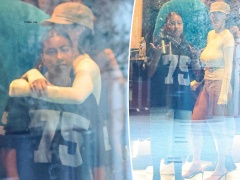
Mary Tyler Moore concealed her blindness for at least 30 years before she died.
“Her significant visual loss actually started to be manifest in the late ’80s,” Moore’s widower, Dr. Robert Levine, exclusively tells Pvnew, adding that the sitcom legend “hid” it “very well” from the public.
The late sitcom legend’s eyesight difficulties stemmed from being diagnosed with type 1 diabetes when she was 34 years old.


In the late ’80s, Moore, who died in 2017 at age 80, underwent “retinal photocoagulation therapy,” which burns out the peripheral retina to preserve the central retina.
“And so she was able to continue to read and to work but she had like, tunnel vision, where she really couldn’t see below her waist,” Levine explains, adding that things “got progressively worse” from there.
Her sight continued to deteriorate so much so that when “The Dick Van Dyke Show” alum was presented with a SAG award in 2012, she was escorted to the podium off-camera.
“They brought the lights up and she was there,” Levine tells us.

“And the reason for that was she could not walk safely across the stage at that point,” he says. “It stole her ability to be autonomous and independent and she couldn’t read … Her joy was robbed from her. So it was devastating.”
Following her death, Levine established the Mary Tyler Moore Vision Initiative to combat diabetic retinal illness.


Moore and Levine, a cardiologist, met when he was treating her mother and she asked him if he had a cure for “acute loneliness.” The couple married in 1983 when Moore was in her late 40s and Levine was 29. They remained married until her death.
Their touching love story is revealed in the recently released HBO documentary “Being Mary Tyler Moore.”
The documentary, co-produced by Lena Waithe, explores her incredible career, first as Laura Petrie on “The Dick Van Dyke Show,” where she bucked convention by wearing pants and flat shoes, and then as feminist icon Mary Richards in her eponymous ’70s sitcom.

The doc also delves into her often tough personal life which includes her younger sister, Elizabeth dying by suicide in 1978, an alcoholic mother, her own battles with alcohol and the loss of her only child, Richie.
Richie, whom she shared with first husband Richard Meeker, died of a self-inflicted gunshot at the age of 24, which was deemed to be an accident.
His death came weeks after the release of the film “Ordinary People,” in which she played an emotionally distant mother grieving one son’s death and barely coping with the attempted suicide of the other.


The documentary hints that Moore herself had a difficult relationship with her son.
Levine says that in conversations with Moore, she felt “alienated” from her son when he was young, but claims they were working on patching up their relationship when he died.
“And so he was stolen from her twice,” he says. “She wished she had been able to spend more time with him [when he was younger] and she was trying to make up for it … They really were coming together just before he died so tragically. So, like any family, you know, there’s difficulty.”

Moore, who, according to the doc, could come across as aloof and detached to friends, changed once she met Levine.
“I guess that kind of happens when you finally find someone you’re comfortable [with] and can relax,” he tells us, “and who doesn’t judge and allows you to show a little bit more of yourself.
“You don’t have to hide, you know, say you create a safe space for someone that you love. And I’m grateful that I was able to do that with her and she was able to do that for me.”
 mentary." >
mentary." >Levine believes that Moore’s stay at the Betty Ford Clinic in 1984 also helped break her reserve.
“In gaining that sobriety, I think she also understood that she didn’t have to be perfect,” he theorizes. “She could be more open. She knew she could talk about the toughest things in her life.”
“Being Mary Tyler Moore” is currently streaming.






